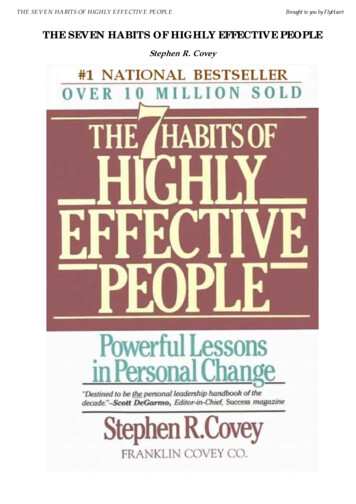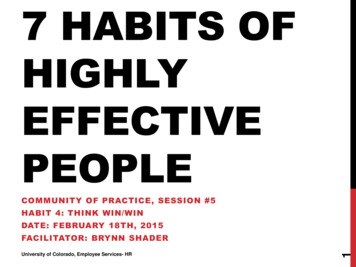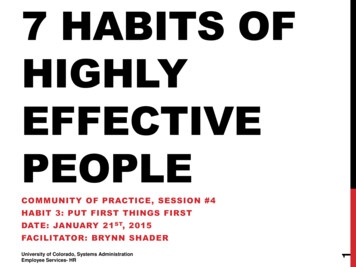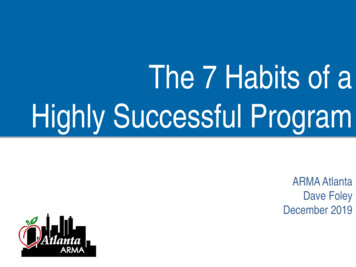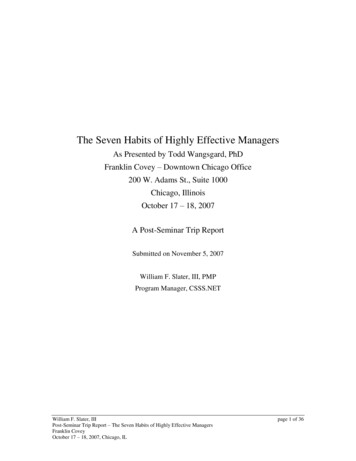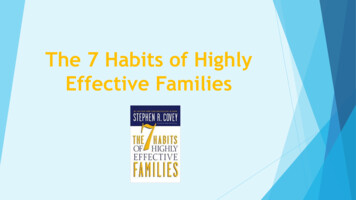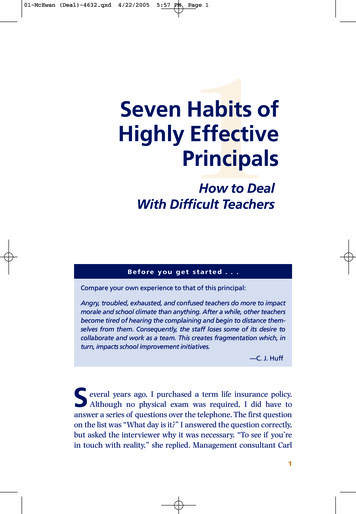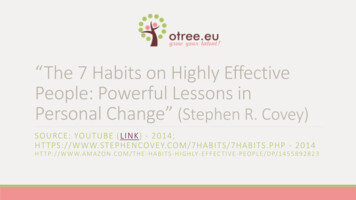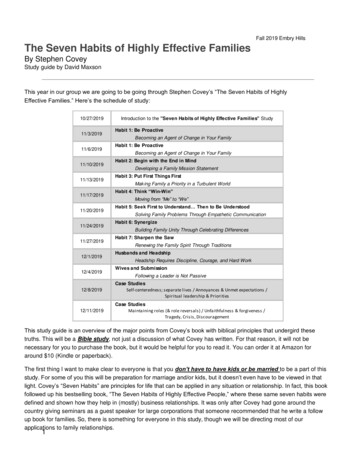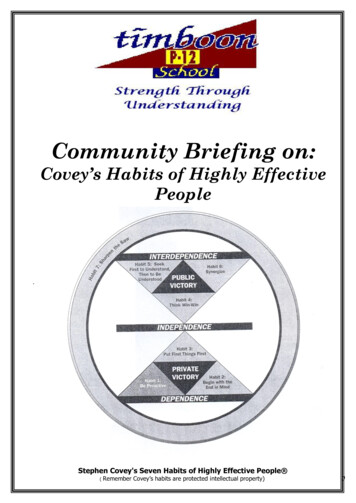
Transcription
Community Briefing on:Covey’s Habits of Highly EffectivePeople.Stephen Covey's Seven Habits of Highly Effective People (Remember Covey’s habits are protected intellectual property)0
IndexPage234567891011121314141717Habits definedDefining a habitParadigms and PrincipalsThe Private VictoryHabit 1- Be proactiveHabit 2- Begin with the end in mindHabit 3- Put first things firstTime quadrantsThe Public VictoryHabit 5- Seek first to understand then to be understoodHabit 6- SynergyHabit 7 - Sharpen the sawHabit 8 – Finding your voiceQuotes that support the habitsThe ABC of using the habitsReading RecommendationsStephen Covey's Seven Habits of Highly Effective People (Remember Covey’s habits are protected intellectual property)1
Seven Habits of Highly Effective PeopleHabit 1: Be ProactiveTake responsibility for your life.Habit 2: Begin with the End in MindDefine your mission and goals in life.Habit 3: Put First Things FirstPrioritise, and do the most important things first.Habit 4: Think Win-WinHave an everyone-can-win attitude.Habit 5: Seek First to Understand, Then to Be UnderstoodListen to people sincerely.Habit 6: SynergizeWork together to achieve more.Habit 7: Sharpen the SawRenew yourself regularly.Habit 8: Find your voice and inspire others to findtheirs.To deal with people in a way that will communicate to them their worthand potential so clearly they will come to see it in themselves.Stephen Covey's Seven Habits of Highly Effective People (Remember Covey’s habits are protected intellectual property)2
Defining a habit and explaining how thehabits can help us.WHAT EXACTLY ARE HABITS?Habits are things we do repeatedly. But most of the time we are hardly aware that we have them.They're on autopilot.Some habits are good, such as: Exercising regularlyPlanning aheadShowing respect for othersSome are bad, like: Thinking negativelyFeeling inferiorBlaming othersAnd some don't really matter, including: Taking showers at nightEating yogurt with a forkReading magazines from back to frontThe 7 Habits can help you: Get control of your lifeImprove your relationships with your friendsMake smarter decisionsGet along with your parentsOvercome addictionDefine your values and what matters most to youGet more done in less timeIncrease your self-confidenceBe happyFind balance between school work, friends, and everything elseStephen Covey's Seven Habits of Highly Effective People (Remember Covey’s habits are protected intellectual property)3
Paradigms and PrinciplesParadigm is another word for perception.Here are some examples of perceptions:There is no reason for any individual to have a computer in their home.“Kenneth Olsen, President and found of Digital Equipment Corp. 1977”Man will never reach the moon regardless of all scientific advances.Dr. Lee Forest, Inventor of the Audion Tube and Father of Radio (Feb 25th 1967)Television won’t be able to hold on to any market it captures after the first six months. People will soon gettired of starting at a plywood box every night.Darryl F Zanuck. Head of 20th Century Fox in 1946Statements made by real teens.No one in my family has ever gone to Uni. I’d be crazy to think I could make it.My teacher is out to get me.Me? Thin? Are you kidding? My whole family is full of fat people.Our paradigms can often be way off the mark and as a result they create limitations.Paradigms are like wearing a pair of glasses that at times could have the wrong prescription. The lens affectshow you see everything.We have paradigms about ourselves, about other people and about life in general.Ask yourself “What is the driving force of my life?”Is it friend centred, stuff (possession) centred, girl friend-boyfriend centred, school centred, sport or hobbycentred.There is a fine line between having a passion for something and basing your entire existence on it.To obtain balance in life you need to live a principle-centred life.What are principles: Honesty, hard work (persistence) organisation, cooperation (Yes this is where You Can DoIt fits into the picture) The National School Network Norms are principles that we ask our teaching staff tooperate by.Adopt a sense of responsibility in and for the groupAttend to others and listenCooperate in good faithConfront problems and differences of opinion respectfullyAccept where others are atAllow and give no put downsSuspend judgmentWe need to understand our principles and paradigms so that when we explore the 7 Habits of Highly Effectivepeople we know the driving force behind our own Thinking.Stephen Covey's Seven Habits of Highly Effective People (Remember Covey’s habits are protected intellectual property)4
The Private Victory"Each of us wants to feel adequate to his world in control of his situation and, thus, of his destiny”.Before you’ll ever win in the public arenas of life, you must first win private battles within yourself. All changebegins with you.How you feel about your self is like a Personal Bank Account.Improving Self-Esteem:What things do you consider to be deposits in your own personal bank account. What events are deposits andwhat are withdrawals. We all need to give to seek out opportunities that add to our own personal bank accounts.Some examples:PBA DepositsPBA WithdrawalsKeep promises to yourselfBreak personal promisesDo small acts of kindnessKeep to yourselfBe gentle with yourselfBeat yourself upBe honestBe dishonestRenew yourselfWear yourself outTap into your talentsNeglect your talentsThe first three habits, 1. be proactive, 2. begin with and end in mind, and 3. put the first things first, aregrouped together in a category called private victory. Private victories are personal and relate to you as anindividual person.Habit 1: Be proactiveThis habit is the basis of all further habits and a cornerstone of success. Be proactive means a combination oftake action and take responsibility. You are the person who is going to have the biggest influence in how yourlife turns out. You have the opportunity to use your free will and work hard to change yourself and yourcircumstances. You are only a victim if you allow yourself to be. The main thrust of this habit is to do whateveris in your power to make things (your situation) better. You are the creator, the actor and the doer in your life,get started and "just do it".Habit 2: Begin with an end in mindThis habit could be restated, visualize where you want to go. Before you start doing something sit down andplan it out. A couple of minutes planning will usually save you many minutes of actual work later on. Use yourcreative forces to create images and plans in your head first, then carry out your plan. The plan is called the firstcreation, and when you carry out the plan it is the second creation. For your "second creation" to be successful,you should have a well thought-out "first creation".Habit 3: First things firstThis habit deals with setting priorities. Decide what values and goals are most important for you, then decidewhat steps are most important for you to take to achieve those goals.Stephen Covey's Seven Habits of Highly Effective People (Remember Covey’s habits are protected intellectual property)5
Habit 1 – Be ProactiveSelf-awareness enables us to stand apart and examine the way we see ourselves.It is our map of the basic nature of mankind.The Social MirrorThere are three widely accepted theories of determinism: Genetic determinism holds that you inherit your personal tendencies and character.Psychic determinism holds that your upbringing and childhood experiences mould you.Environmental determinism holds that environmental factors are responsible.Between Stimulus and ResponseFrankl, a psychologist in the Freudian tradition, recognized that "between stimulus and response, man has thefreedom to choose." Imagination -- the ability to create in our minds beyond our present reality.Conscience -- an inner awareness of right and wrong.Independent will -- the ability to act based on self-awareness.Proactivity DefinedProactivity: As human beings we are responsible for our own lives. Reactive people are driven by feelings, circumstances, conditions, the environment.Proactive people are driven by carefully considered, selected and internalized values.Taking the InitiativeTaking the initiative does not mean being pushy, obnoxious, or aggressive. It does mean recognizing ourresponsibility to make things happen.Circle of Concern/Circle of InfluenceWhere do you focus your time and energy? Proactive people focus their efforts in the Circle of Influence.Reactive people focus their efforts in the Circle of Concern.People are just about as happy as they make up their mind to be. (Abraham Lincoln)Stephen Covey's Seven Habits of Highly Effective People (Remember Covey’s habits are protected intellectual property)6
Habit 2 – Begin with the End in MindWhat it Means To begin with the end in mind is to begin with the image of the end of your life as the frame of reference bywhich everything else is measured.We may be busy, we may be efficient, but we will only be effective if we begin with the end in mind.Habit 2 is based on the principle that all things are created twice:o a mental or first creationo a physical or second creationLeadership and Management Habit 2 is based on principles of personal leadership, which means that leadership is the first creation.Management is the second creation.Management is doing things right, leadership is doing the right things.Often people get into managing with efficiency, setting and achieving goals before they have even clarifiedvalues.A Personal Mission Statement The most effective way to begin with the end in mind is to develop a personal mission statement.The key to the ability to change is a changeless sense of who you are, what you are about, and what youvalue.Once you have a sense of mission, you have the essence of your own proactivity; the vision and valueswhich direct your life, the basic direction from which you set your goals.At the CentreWhatever is at the centre of our life will be the source of our security, guidance, wisdom, and power.Spouse centerednessFamily centerednessMoney centerednessWork centerednessPossession centerednessPleasure centerednessFriend/enemy centerednessChurch centerednessSelf centerednessA Principle Centre Our lives need to be centred on correct principles -- deep, fundamental truths, classic truths, generic commondenominators.As a principle centered person, you try to stand apart from the emotions of situations and from other factorsto evaluate options.Assignment :Write a mission statement for your week/ month/year/life.Stephen Covey's Seven Habits of Highly Effective People (Remember Covey’s habits are protected intellectual property)7
Habit 3 – Put First Things FirstHabit 3 Defined Habit 3 is the second or physical creation.Habit 3 is the exercise of independent will toward becoming principle centered.The Power of Independent Will The degree to which we have developed our independent will is measured by our personal integrity.Integrity is the value we place on ourselves.Effective management is putting first things first.Four Generations of Time Management Notes and checklistsCalendars and appointment booksPrioritization, clarifying values, comparing the relative of worth of activitiesPreserving and enhancing relationships and accomplishing resultsQuadrant II Urgent matters are usually visible, they insist on action, they are easy and fun to do.Important matters contribute to our mission.Effective people stay out of Quadrants III and IV.Quadrant II is the heart of effective personal management.The Time Quadrant for AdultsStephen Covey's Seven Habits of Highly Effective People (Remember Covey’s habits are protected intellectual property)8
What It Takes to Say "No"The only place to get time for Quadrant II in the beginning is Quadrants III and IV. If you were to fault yourself in one ofthree areas, which would it be? The inability to prioritizeThe inability or desire to organize around those priorities.The lack of discipline to execute around them.The Quadrant II ToolA Quadrant II organizer will meet six criteria: Coherence. Harmony, unity, and integrity between vision and mission, priorities and plans, and desires anddiscipline. Balance. Success in the various roles of our life. Quadrant II Focus. Organize your life on a weekly basis. Schedule your priorities don't prioritize what's on yourschedule. A "People" Dimension. Focus on people not just the schedule. Flexibility. The planning tool should be tailored to you. Portability. You should be able to carry your tool with you.Becoming a Quadrant II Manager1. Identify roles2. Select goals3. Schedule4. AdaptNot ImportantImportantThe Time Quadrant for Teenagers Urgent1The ProcrastinatorExam tomorrowFriend gets injuredLate for workProject due today Car breaks down2The Yes-Man Unimportant phone calls Interruptions Other people’s small problems Peer pressure Not Urgent2The ProritiserPlanning, goal settingEssay due in a weekExerciseRelationships Relaxation 4The SlackerToo much TVEndless phone callsExcessive Computer gamesMall marathons Time wasterStephen Covey's Seven Habits of Highly Effective People (Remember Covey’s habits are protected intellectual property)9
The Public VictoryThe second set of three habits, 4. think win-win, 5. seek first to understand, then be understood, and 6.synergize, are the basis for public victory.Public victory is success with others in teams and in relationships in general. They are shared victories where youhelp and are helped by other people.Public victories are built on the private victories of the first three habits. To be publicly successful in a deep or realway, you should first build the first three habits into your character. To try to do things another way is building on afalse foundation and will bring about only short-term results.Habit 4: Think win-winMany of us grow up with
07.06.2016 · We need to understand our principles and paradigms so that when we explore the 7 Habits of Highly Effective people we know the driving force behind our own Thinking. Stephen Covey's Seven Habits of Highly Effective People ( Remember Covey’s habits are protected intellectual property) 5 The Private Victory "Each of us wants to feel adequate to his world in control of his situation and .
